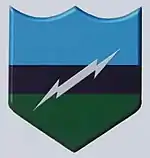Military College of Telecommunication Engineering
The Military College of Telecommunication Engineering (MCTE) is the engineering training establishment for the Corps of Signals, established 1911, of the Indian Army. It is located near Indore, in the town formerly known as Mhow, now called Dr Ambedkar Nagar, in Madhya Pradesh.[1] The present Commandant is Lt Gen M Unikrishan Nair.[2]
 | |
| Established | 1 October 1967 |
|---|---|
| Owner | Ministry of Defence , Government of India |
| Location | , , |
| Coordinates | 22.535°N 75.763°E |
Military College of Telecommunication Engineering celebrated its Platinum Jubilee 22 Septemober 2021.[3]
Composition
The Military College of Telecommunication Engineering has the following Faculties:[4]
- Headquarters Military College of Telecommunication Engineering
- Faculty of Combat Communications Engineering (FCC)
- Faculty of Communications Engineering (FCE)
- Faculty of Computer Technology and Systems (FCTS)
- Cadets Training Wing (CTW)
Important Visits
- Admiral R. Hari Kumar, PVSM, AVSM, VSM, ADC Chief of naval Staff visited MCTE & was briefed on training conducted in Artificial Intelligence, Cyber Ops & game changing innovations being undertaken. He appreciated the efforts of MCTE in ushering a new era of tech revolution in def forces.[5]
 Lt Gen MU Nair, SM Commandant MCTE Briefing Admiral R Hari Kumar, PVSM, AVSM, VSM, ADC Chief of naval Staff
Lt Gen MU Nair, SM Commandant MCTE Briefing Admiral R Hari Kumar, PVSM, AVSM, VSM, ADC Chief of naval Staff Group Photograph at MCTE during visit of Admiral R Hari Kumar, PVSM, AVSM, VSM, ADC Chief of naval Staff
Group Photograph at MCTE during visit of Admiral R Hari Kumar, PVSM, AVSM, VSM, ADC Chief of naval Staff
- Visit of Chief of Defence Staff (CDS): CDSGeneral Bipin Rawat and GOC-in-C, Army Training Command (ARTRAC) Lieutenant General Raj Shukla visited MCTE on 25-26 August 2021.[6] They encouraged the initiatives taken and innovations done by MCTE.
- Visit of Chief of Army Staff (COAS): COAS Gen Manoj Mukund Naravane visited MCTE on 29 December 2021. He was briefed on modern technological innovations such as Artificial Intelligence and Quantum computing.[7]
Hackathon
Military College of Telecommunication Engineering, Mhow conducted the first Cyber Threat Seminar cum Hackathon for the Indian Army called Sainya-Ranakshetram. [8] The Hackathon began on October 1, 2021 and concluded on 11 February 2022. Around 15,000 participants enrolled. As per the Twitter handle of Army Training Command the following were the winners of Indian Army Hackathon Sainya Ranakshetram.
| Secure Coding | SDR Exploitation | CTF |
|---|---|---|
| Sarthak Misraa (1st) | Lt Prateet Singh (sole winner) | Gaurav Bhatia (1st) |
| Capt Kashish Rohilla (2nd) | Gourav Suram (2nd) | |
| Abhijith P Kumar (3rd) | Tushar Chopra (3rd) |
 Hackathon : Sainya-Ranakshetram Home Page
Hackathon : Sainya-Ranakshetram Home Page Winners during the Video Conference
Winners during the Video Conference Winners Page of First Indian Army Hackathon: Sainya Ranakshetram
Winners Page of First Indian Army Hackathon: Sainya Ranakshetram Winners and participants of hackathon
Winners and participants of hackathon Chief of Army Staff interacting with participants
Chief of Army Staff interacting with participants
Quantum computing lab
Indian Army had set up a quantum computing lab and artificial intelligence in it to study post-quantum cryptography, quantum communication with the support of National security council. [9] [10][11]
References
- "Corps of Signals celebrates 98th Raising Day". Indian Express. 16 February 2008. Archived from the original on 30 July 2012.
- "Lt Gen M Unikrishnan Nair, SM the new Commandant of MCTE". Daily Pioneer. 30 December 2020.
- "Military College of Telecommunication Engineering Platinum Jubilee". Free Press Journal. 22 September 2021.
- "Brief History of MCTE". Official Web Page of the event.
- budharam bishnoi [@budharam07]. "CNS Visits MCTE" (Tweet) – via Twitter.
- "CDS visits MCTE". Free Press. 27 August 2021.
- "COAS visits MCTE". ANI. 29 December 2021.
- "Indian Army Hackathon : Sainya-Ranakshetram". Daily Pioneer. 1 October 2021.
- "Army Sets Up New Quantum Computing Lab, Artificial Intelligence Centre. Details Here". 29 December 2021.
- "MP: Indian Army Establishes Quantum Laboratory In Military College Of Telecommunication Engineering". Vibes Of India. 29 December 2021. Retrieved 30 December 2021.
- India, The Hans. "Indian Army sets up Quantum & AI lab". The Hans India. Retrieved 30 December 2021.